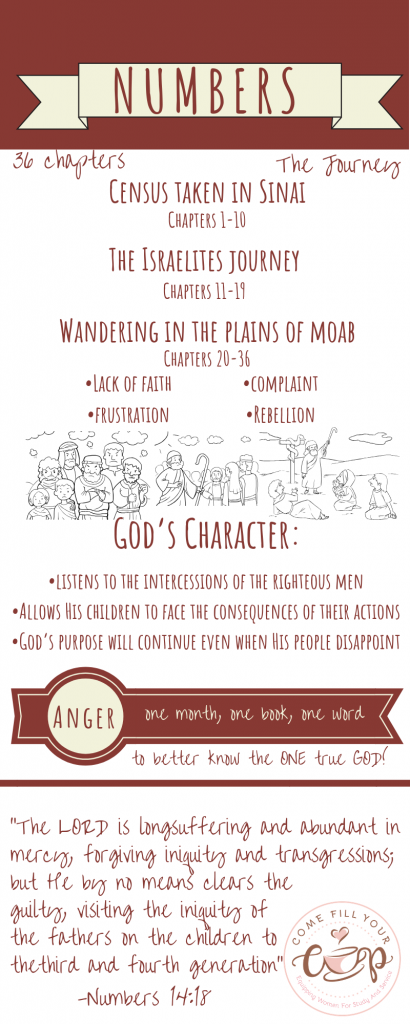
They say the best way to get to know someone is to go on a long trip with them. One can only keep up appearances for so long. Eventually, the distance, togetherness, and inevitable bumps in the road will bring out a person’s true character: The good, the bad, and the ugly. With a keyword of “journey” in the book of Numbers, it stands to reason that we would learn something of the Israelites’ character as they set out for their journey from Sinai to the land promised to Abraham (Gen 17:8).
Numbers gets its name from the two census counts taken in the book. The first taken while at Sinai (chapters 1-10), where a significant amount of organization takes place to prepare to safely and effectively move over 600,000 men plus their families, belongings, and the tabernacle. As they journey through the wilderness of Paran to Kadesh-Barnea (chapter 11-19), frustration, complaint, and rebellion begin to rear their ugly heads. Ultimately, what should have be an eleven-day journey to Canaan turns into thirty-eight years of wandering in the Plains of Moab (chapters 20-36) due to a lack of faith. The true character of the Israelites (not all of it negative) is on display throughout the book of Numbers, but so is God’s! What do we learn about Him?

God listens to the intercessions of righteous men. Though the book of Leviticus is extremely detailed, God was not finished giving instruction. Further instruction on laws and offerings is given in Numbers, and even still, Moses had to seek God’s counsel on how to handle several situations. Even further, Moses was willing to approach God’s throne before the impending judgement on the people for their refusal to enter Canaan (chapter 14) and for Aaron and Miriam’s jealousy (chapter 12). God heard and responded favorably to Moses’ requests. Just like Abraham for the city of Sodom (Gen. 18), and Job pleading for his friends (Job 42:10), man can intercede between God and judgment. What a blessing to know that under the New Covenant this ability is not regulated to spiritual giants of the past. The ultimate intercession of our Savior on our behalf, gives us the promise that the “effective fervent prayer of any righteous person avails much” (James 5:16)!
God allows His children to face the consequences of their actions. If there is one lesson that we can learn from Numbers, it’s that sin brings devastating results. Plagues, fire, being swallowed by the ground, and hanging are some of the violent ways thousands of Israelites died in the wilderness. It is tempting to ask, “How could God be so cruel?” The answer partly comes in a key verse of the book: “The LORD is longsuffering and abundant in mercy, forgiving iniquity and transgression; but He by no means clears the guilty, visiting the iniquity of the fathers on the children to the third and fourth generation” (Numbers 14:18). Rebellion is a serious thing with God. All that we can say for sure is that only God knew how rebellion would affect those around it, and whatever the consequences, God handled it perfectly (see Gen. 18:25).
God’s purpose will continue even when His people disappoint. Moses faced significant trials as a leader, but nobody could ever accuse him of not trying to do the right thing. Still, he disappointed God in a moment of frustration (Num. 20:7-12). Though we have family members and spiritual leaders that we trust, we can be assured that they will disappoint us. It is not God’s desire that we fail, but God will work despite or failures. God still provides, even when His people blow it. The last few chapters of Numbers end with hope for a new generation as God begins to assign the promised shares of inheritance and prepares them to try again. It is an encouraging reminder that He still longs to bless – even when we make a mess.
Challenge: Our word this month is “anger” (wrath). Though, it is not a pleasant topic to consider, the phrase “anger of the LORD” occurs often in the book. Make a list of the occasions that stirred up God’s wrath. What was the reason and what was the consequence? What can I learn about the wrong choices of the people from the past? We serve an unchanging God (Heb 13:8). Am I guilty today of some of these same things? After you read Numbers, spend time meditating on Hebrews 3-4.
The Christian life is often compared to a journey. The same way that generation of Israel missed their destination because of unbelief, we can miss our destination in our unfaithfulness. Instead we ought to imitate the faith of those who “wholly followed the LORD” (Num 32:11-12) as we journey to “the city whose builder and maker is God” (Heb.11:10).
by Kathryn Baker
 Welcome! We are so glad you stopped by. Come Fill Your Cup is a group of Christian ladies dedicated to equipping women for study and service. We know you are busy and that life’s hectic pace pulls you in so many directions, but you can’t truly be the woman God desires unless you take time to fill your own cup…not with spa days (though we love a good spa!) or the latest novel…but with God’s Holy Word. We want to help you with that! Our goal is to reach you in the midst of your busy day and give you encouragement, education, and fellowship as you strive to live the life God has laid before you. Our prayer is that we can help fill your cup so that you, in turn, can overflow to all those around you. So, as we like to say…come fill your cup, and let it overflow!
Welcome! We are so glad you stopped by. Come Fill Your Cup is a group of Christian ladies dedicated to equipping women for study and service. We know you are busy and that life’s hectic pace pulls you in so many directions, but you can’t truly be the woman God desires unless you take time to fill your own cup…not with spa days (though we love a good spa!) or the latest novel…but with God’s Holy Word. We want to help you with that! Our goal is to reach you in the midst of your busy day and give you encouragement, education, and fellowship as you strive to live the life God has laid before you. Our prayer is that we can help fill your cup so that you, in turn, can overflow to all those around you. So, as we like to say…come fill your cup, and let it overflow!
Leave a Reply